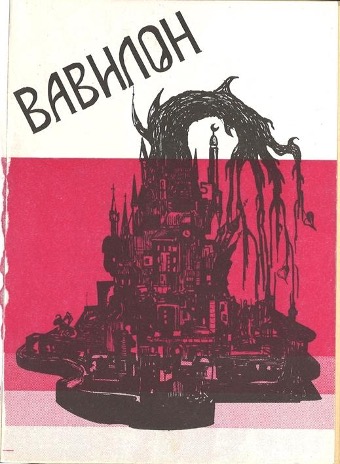Filed Under: Print > Literature > An Online Babylon: Vavilon.ru
An Online Babylon: Vavilon.ru

Cover of the first post-Soviet Babylon almanac (1992)
In 1989, five young poets and writers from Moscow came together to form the group Vavilon (Babylon), which soon put out a samizdat journal under the title Babylon, or Permission to Breathe (Vavilon, ili razreshenie dyshat’). All the Babylonians were under 25 years old, but had little else in common, aesthetically or ideologically. Instead of focusing on one kind of writing or thinking, the group wanted to create “an integrated cultural space, based—for starters—on the idea of a literary generation.”
According to the group’s leader, the poet Dmitry Kuzmin (1968-), “A literary generation is a cultural whole that exists inasmuch as young writers come into their art at the same time, in one and the same literary, cultural, or spiritual situation, no matter how differently they might express themselves in that situation.” All young authors were Babylonians, not only because the Babylonian captivity seemed to be an appropriate metaphor for the situation of contemporary literature at the end of the Soviet years, but also because “anyone who was going anywhere must be going in the same direction.” In 1990, the group held a nationwide competition for young writers. Its 72 winners joined the original five members to form the Babylon Youth Union of Writers, which was officially recognized during the last months of the Soviet Union.
When the USSR finally fell, the group began putting out an almanac, now subtitled “The Review of Young Literature.” This publication became a central clearinghouse for young authors and poets who approached literature “professionally” according to Kuzmin’s definition, that is, with careful attention to language as a medium. By the mid-1990s, Kuzmin put Babylon at the forefront of a battle between what he called literary “professionals” and “marginals.” This latter term designated those who wrote attractive literature by combining genre cliches and playing on readers’ cheapest emotions, populating the growing market for pulp fiction. Kuzmin regarded with alarm the ever-expanding internet as the bailiwick of “marginals,” launching Babylon’s website in 1997 to counteract their creeping influence.
Vavilon.ru announced itself as “the plenipotentiary Internet representative of professional literature,” and, indeed, soon became a central online outpost for serious poetry and fiction with high literary aspirations. By creating a refuge from the market, Babylon provided a new generation of poets and writers a space to develop literary forms that were not immediately marketable. Instead, under Babylon’s banner and later on the Vavilon.ru site, many writers responded to the growing phenomenon of capitalist mass culture by developing forms and methods of critique that would prove vital as the Putin administration clamped down on the public sphere in the years to come.
According to the group’s leader, the poet Dmitry Kuzmin (1968-), “A literary generation is a cultural whole that exists inasmuch as young writers come into their art at the same time, in one and the same literary, cultural, or spiritual situation, no matter how differently they might express themselves in that situation.” All young authors were Babylonians, not only because the Babylonian captivity seemed to be an appropriate metaphor for the situation of contemporary literature at the end of the Soviet years, but also because “anyone who was going anywhere must be going in the same direction.” In 1990, the group held a nationwide competition for young writers. Its 72 winners joined the original five members to form the Babylon Youth Union of Writers, which was officially recognized during the last months of the Soviet Union.
When the USSR finally fell, the group began putting out an almanac, now subtitled “The Review of Young Literature.” This publication became a central clearinghouse for young authors and poets who approached literature “professionally” according to Kuzmin’s definition, that is, with careful attention to language as a medium. By the mid-1990s, Kuzmin put Babylon at the forefront of a battle between what he called literary “professionals” and “marginals.” This latter term designated those who wrote attractive literature by combining genre cliches and playing on readers’ cheapest emotions, populating the growing market for pulp fiction. Kuzmin regarded with alarm the ever-expanding internet as the bailiwick of “marginals,” launching Babylon’s website in 1997 to counteract their creeping influence.
Vavilon.ru announced itself as “the plenipotentiary Internet representative of professional literature,” and, indeed, soon became a central online outpost for serious poetry and fiction with high literary aspirations. By creating a refuge from the market, Babylon provided a new generation of poets and writers a space to develop literary forms that were not immediately marketable. Instead, under Babylon’s banner and later on the Vavilon.ru site, many writers responded to the growing phenomenon of capitalist mass culture by developing forms and methods of critique that would prove vital as the Putin administration clamped down on the public sphere in the years to come.